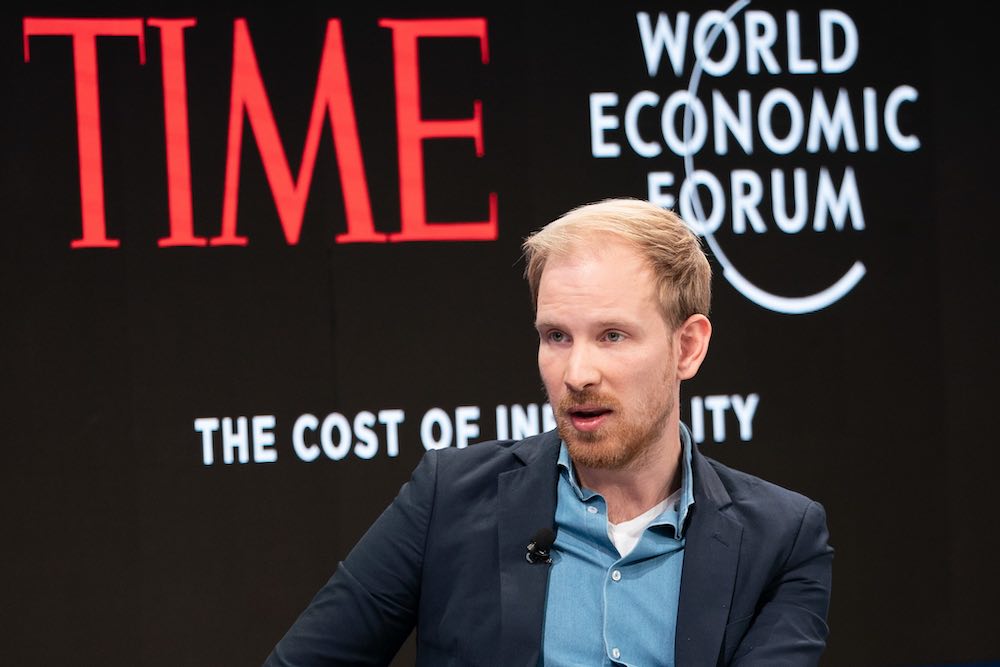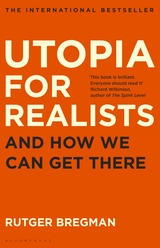Book Review: Utopia For Realists, And How We Can Get There, by Rutger Bregman (Bloomsbury, 2017)
Rutger Bregman shot to public fame calling out billionaires at this year’s World Economic Forum meeting in Davos.
“1500 private jets flying in here to hear Sir David Attenborough speak about how we are wrecking the planet,” he said to a stunned audience at the annual get together of the world’s rich and powerful.
Now that he had everyone’s attention, he went further:
nobody raises the real issue of tax avoidance and the rich not paying their fair share … it feels like I am at a fire fighters’ conference and no-one is allowed to speak about water … we have got to be talking about taxes.
This was Bregman’s first visit to Davos and his invitation came off the back of his recent book, Utopia For Realists. I am not sure he will be asked back.

His book proposes a number of ideas that might be seen in some circles as “radical”. Ideas such as: replacing gross domestic product as a measure of progress; rolling out universal basic income; implementing a fifteen-hour working week; and opening borders to mass migration.
All, he argues, would have a dramatic impact on reducing inequality.
The most well-developed of these ideas is the proposal for a universal basic income. A more limited variation of this approach, cash programming, is all the rage in the aid and humanitarian sector.
Critics will claim that cash distributed without conditions will be wasted but the evidence doesn’t support this view.
At Save the Children, we are involved in dozens of such programs around the world. In Somalia, we provided US$100 a month via basic mobile phones to nomadic herders displaced by drought. In Lebanon, we used a basic MasterCard to allow thousands of Syrian refugees to buy whatever they wanted in hundreds of local shops.
In fact, the Cash Learning Partnership estimates that $2.8 billion was spent on cash and voucher programming in 2016, up 40% from 2015 and nearly double since 2014 (we don’t yet have the 2017 or 2018 numbers but it is likely to have continued to increase).
Distributing cash in a humanitarian crisis is not only more empowering, it reflects the view that the experts on what people need in a crisis are the people that are themselves affected.
And as Bregman demonstrates, there is an enormous body of evidence that giving the poor money to help them survive crisis and escape poverty works. It leads to a lasting increase in income, it helps them build assets such as housing and livestock, and it reduces health issues such as malnutrition, especially among children.
Critics will claim that cash distributed without conditions will be wasted but the evidence doesn’t support this view. A major World Bank Study, cited by Bergman, found that in 82% of all researched cases in Africa, Latin America and Asia, alcohol and tobacco consumption actually declined.
Extending such unconditional cash distributions to high income contexts is currently much more controversial.
This is why I was so surprised to read just how many pilot programs of unconditional cash disbursements had been tried in the past in countries such as Canada, the United Kingdom and the United States.
Most surprising of all is that Richard Nixon himself championed such a scheme. In 1969, he was on the verge of providing US$1,600 of unconditional cash to each poor family in the US. According to Nixon, “Tory men and liberal policies are what have changed the world”, and this was a chance for Nixon to make history. And rather than being seen as “radical”, a White House poll found 90% of all US newspapers receptive to the idea.
Nixon’s Basic Income Bill passed the House but repeatedly failed to pass the Senate, and Nixon eventually gave up.
Sceptical taxpayers might assume that such a program today would be unaffordable but Bregman estimates that “eradicating poverty in the US would cost only US$175 billion”, equivalent to about 1% of US Gross Domestic Product and roughly a quarter of what the US spends on its military. This doesn’t seem such a big price to pay.
 Such a scheme in Australia would massively simplify the current complex system of social welfare payments. It would also eliminate what Bregman describes as the “perverse behemoth of control and humiliation” imposed on welfare recipients.
Such a scheme in Australia would massively simplify the current complex system of social welfare payments. It would also eliminate what Bregman describes as the “perverse behemoth of control and humiliation” imposed on welfare recipients.
Whether it would reduce inequality, as Bregman contends, is more contested. The Greens believe a universal basic income would be a “bold move towards equality”. On the other hand, Labor’s shadow assistant treasurer Andrew Leigh has argued such a program would actually increase inequality.
But perhaps the most controversial element is not that such a program would give money to the poor, but that it would give the money to all. The argument in favour of “universal” is political: people will be more likely to support such a system if it benefits them personally.
Whatever your view, the articulation of bold policy ideas is welcome. Quoting Oscar Wilde, Bregman says “progress is the realisation of utopias”. Unfortunately, most of us seem to have lost the capacity to imagine a better world. Utopia For Realists helps unlock our minds and dream of the possible.

